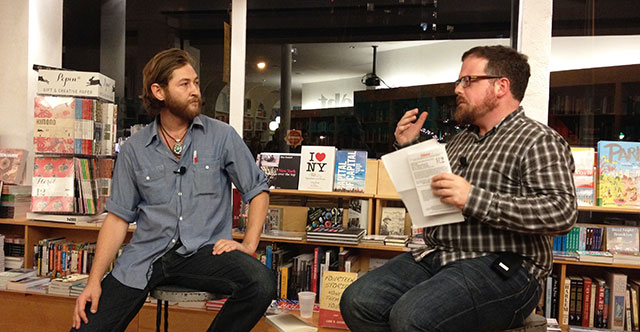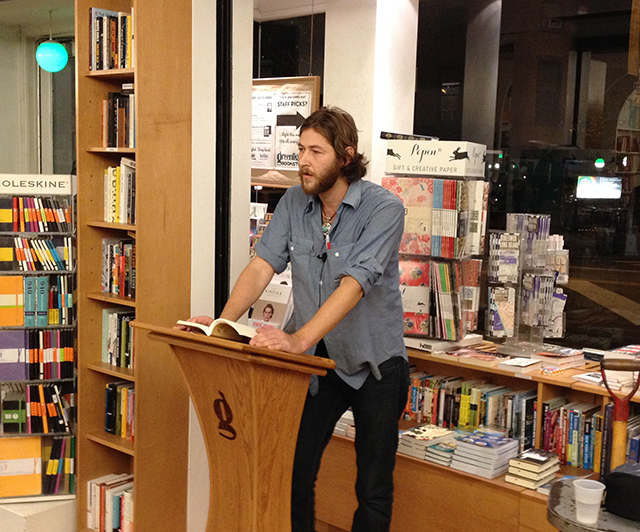
Luke Goebel’s debut novel, Fourteen Stories, None of Them Are Yours, actually only contains thirteen stories. A poetic explanation might simply be that the fourteenth story is the one created when the individual parts come together as a amalgamated narrative, but Goebel confesses that he just “fucked up.” He liked the mistake though, and kept the title, explaining the title to Tobias Carroll, editor of Vol 1 Brooklyn. Greenlight Bookstore hosted the pair, in conjunction with Franklin Park Reading Series’s curator Penina Roth, on Monday for a reading and discussion.
Goebel says New York City makes him nervous. He’s originally from Oregon and now teaches at the University of Texas – Tyler. He has also spent time traveling around the west in an RV working on his stories. Transience is part of his literary identity.
The first thing Carroll asks Goebel regards the form of the novel. Each of the chapters feels like a s solitary, though come together as a novel, and throughout, portions of the text are bracketed.
The form evolved from Goebel’s travels. He says he never saw himself as writing a story collection, or a novel, only that he was writing stories. Things happened–he lost his brother, he lost Catherine–real events that ended up in the final book. He just kept writing. Eventually he ended up with what seemed a collection, but he knew it wasn’t finished.
He took what he had written on the road in the RV. He was having adventures, filling in the missing pieces of the narrative he already wrote with new things and old things he was rediscovering. He won’t say the story is a memoir in part because he enjoys what he calls “the freedom of fiction.”
Almost all of the original writing from before his road trip remains, but he added to what was already there through a process of accretion. He developed a system of brackets and parenthetical and double parentheticals to help control the narrative and time within the narrative.

New York City, despite Goebel’s anxiousness, remains a ghostly presence in the novel, notes Carroll.
“I’m definitely inhabited by different places,” Goebel says. The idea of movement and getting out persists.
“Sometimes the city is great and sometimes its just not.”
For the last four years, Goebel has been living in the south. His impulse, he says, is to say that the time has changed him, but not that he is necessarily a southern writer. He prefers to think of himself as a writer interested in that motion of traveling. He says as a young reader, he was obsessed with the American road trip narratives like On the Road and One Flew Over the Cuckoo’s Nest.
Some of the stories have a little more distance from the central narrative than others. Goebel says it was an intentional choice to look at the larger world, to place it in context. He wanted the narrative also to expand beyond just himself.
The current project he is working on is a third person narrative that retains a close lens. He says the new project has something stuff–plot–happening. There is a sense of disgust when he says this.
Much of the novel feels organic, Carroll says, demanding to know how Goebel achieved it. Goebel responds that he was simply being direct in his writing. His preference is to be direct. He doesn’t seem to have an answer beyond that. “I don’t know what the fuck I’m doing when I’m writing. I’m in it.”
There is a sense that Goebel simply absorbs experiences. He’s untethered to any place–
“Everywhere I go everyone knows I’m clearly not from there.” But that disjointedness leaves him a keen observer.
He says he wouldn’t describe himself as a particular political, but he does describe America as a “destructive” force on the people he loves.
Goebel explains that before his book came out, he felt as though he had infinite possibilities. He had all the potential as a writer. After a debut book is published though, a writer sees the traits that define him.
Luke B. Goebel and Tobias Carroll
Monday, September 22, 2014
Greenlight Bookstore